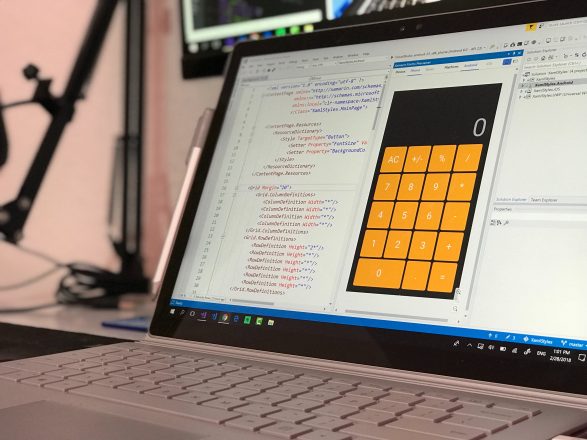Ace Mobile App Dev: Exam Q&A You Must Know!

Entering the realm of mobile application development requires not only practical coding skills but also a solid understanding of the underlying principles and concepts. With the rising demand for mobile applications, proficiency in this domain has become a sought-after asset. As a result, mobile application development exams are integral to the assessment of a developer’s expertise. These exams test candidates on a wide array of topics, from the basics of mobile app architecture to the intricacies of user interface design and functionality.
For those preparing to undertake such examinations, it is imperative to be well-versed in the mobile application development exam questions and answers. This preparation not only solidifies one’s knowledge but also instills confidence to tackle the exam effectively. At Biz4Solutions, we are committed to equipping aspiring developers with the necessary tools and insights to excel in these evaluations. Our expert Q&A guide is meticulously designed to cover key questions that reflect the latest trends and best practices in the industry.
Whether you are a beginner aiming to enter the field or a seasoned professional seeking to validate your skills, understanding the types of questions that may appear on the exam and the appropriate responses is crucial. In the subsequent sections, we will delve into specific exam topics, providing you with a strategic advantage in your journey to becoming a certified mobile app developer.
Understanding the Basics of App Development

At the heart of any mobile application development exam lies a comprehensive evaluation of the basics. Before diving into complex code and advanced features, it’s essential for candidates to have a firm grasp of the foundational elements. These fundamentals include understanding different mobile operating systems like iOS and Android, grasping the principles of responsive design, and recognizing the significance of user experience (UX).
Aspiring developers must be familiar with the key programming languages used in mobile app development, such as Swift for iOS and Kotlin or Java for Android. Moreover, a sound knowledge of cross-platform development frameworks like React Native or Flutter can be a significant advantage, enabling the creation of apps that run seamlessly across multiple platforms.
Questions in this area may explore topics like the app development lifecycle, which encompasses stages from ideation and design to development and deployment. Additionally, exam questions might address the importance of following app store guidelines and understanding security measures to protect user data. It’s not just about building an app; it’s about crafting a safe and engaging experience that aligns with industry standards and user expectations.
By mastering these basic concepts, candidates can build a robust foundation that will support their understanding of more advanced topics in the mobile app development landscape. This knowledge is not only vital for exam success but also for real-world application where these principles are applied daily in the pursuit of creating innovative and user-friendly mobile applications.
Common Questions on Mobile App Design Principles

When it comes to mobile application development exam questions and answers, a prominent section is often dedicated to mobile app design principles. It is crucial for candidates to understand that design is not just about aesthetics; it is about creating an intuitive and accessible user interface that enhances the user experience. Questions in this domain may cover topics such as the significance of minimalistic design, the use of color psychology, and the importance of maintaining consistency throughout the app.
Prospective developers are expected to know the best practices for designing for different screen sizes and resolutions, ensuring that apps are accessible on a wide range of devices. This includes an understanding of flexible layouts and scalable graphics. Moreover, the incorporation of touch gestures and animation can also be a subject of inquiry, as these elements contribute to the responsiveness and interactivity of the app.
Another area that might be explored in exam questions is the adherence to platform-specific design guidelines, such as Apple’s Human Interface Guidelines and Google’s Material Design. These standards help maintain a native look and feel for apps, which is critical for user acceptance. Keeping up with the latest design trends and understanding how they can be applied to improve functionality and appeal can also be a critical part of the exam.
By delving into these design principles, individuals can demonstrate their ability to create apps that are not only visually appealing but also user-centric and aligned with the expectations of modern mobile users. This understanding is indispensable for anyone looking to excel in mobile application development and design.
Navigating Through Advanced App Development Topics
As aspiring mobile developers progress towards more sophisticated concepts in their educational journey, they will encounter advanced app development topics. These subjects are designed to challenge students to think beyond the basics and apply their knowledge to solve complex problems. It is essential for learners to be prepared for exam questions that delve into areas such as integrated development environments (IDEs), version control systems, and continuous integration/continuous deployment (CI/CD) practices.
Students may be tested on their understanding of advanced programming languages and frameworks that are pivotal in building robust and scalable mobile applications. They should be well-versed in the nuances of languages like Swift for iOS development and Kotlin for Android development. Furthermore, cross-platform development tools such as React Native or Flutter may also be a focal point, as they offer the ability to write code once and deploy on multiple platforms.
Security is another critical topic within advanced app development. Exam questions could address secure coding practices, encryption techniques, and methods for safeguarding user data against vulnerabilities. Additionally, the ability to optimize app performance through efficient memory management, effective use of databases, and responsive design is key to creating high-quality mobile applications.
Finally, understanding how to incorporate advanced features such as Artificial Intelligence (AI), Machine Learning (ML), and Internet of Things (IoT) connectivity can set a developer apart in the competitive field of mobile app development. Questions on these topics not only test a candidate’s technical knowledge but also their capacity to innovate and integrate cutting-edge technologies into their applications.
Expert Answers to Tricky Mobile App Dev Questions

When it comes to mastering mobile application development, students must not only understand the material but also be able to navigate through tricky mobile app dev questions that test their critical thinking and problem-solving skills. This section provides expert answers to some of the more challenging aspects of mobile app development exams, ensuring that learners are well-equipped to handle complex scenarios.
For instance, students might encounter questions about optimizing battery life while maintaining performance. Experts recommend implementing best practices such as efficient use of services, reducing the frequency of background tasks, and avoiding unnecessary network calls. Another common question revolves around the management of state in mobile applications, particularly in reactive programming models. The answer lies in understanding the specific state management techniques such as the use of Redux in Flutter or ViewModel in Android Jetpack.
Memory leaks are another area where developers often stumble. Questions on this topic require a deep understanding of memory management, and experts suggest regular profiling of applications and being cautious with context and listeners in Android or strong references in iOS closures. Multithreading and concurrency issues are tricky as well, with answers pointing towards the use of GCD (Grand Central Dispatch) in iOS and coroutines in Kotlin for Android to handle asynchronous tasks effectively.
Moreover, questions may probe a student’s proficiency in implementing accessibility features and localization in apps. Expert answers emphasize the importance of following platform-specific guidelines and using tools such as Android’s TalkBack or iOS’s VoiceOver to enhance app usability across diverse user groups and languages.
By reviewing these expert responses and understanding the rationale behind complex solutions, students can gain confidence in their ability to tackle even the most daunting mobile application development exam questions and answers.
Final Thoughts on Mastering App Development Exams

As we wrap up our exploration of mobile application development exam questions and answers, it’s clear that success hinges on a combination of theoretical knowledge and practical proficiency. To truly master app development exams, students must delve beyond rote memorization and engage with the material in a way that fosters innovation and problem-solving.
Understanding the underlying principles of mobile app development, such as the life cycle of an application, user experience design, and the intricacies of different development platforms, is critical. Additionally, hands-on experience with coding, debugging, and deploying apps will solidify this knowledge and prepare students for the types of questions they will face in an exam setting.
It’s also essential to stay updated with the latest trends and advancements in the field. Mobile technology evolves rapidly, and exams may include questions on emerging tools and frameworks. Regularly practicing with new technologies and contributing to real-world projects can give students an edge.
At Biz4Solutions, we provide comprehensive resources and expert guidance to help you navigate the complexities of mobile app development. Whether you’re preparing for an upcoming exam or seeking to enhance your professional skills, our seasoned developers are here to support your journey towards excellence in this dynamic field.
Embark on your path to success with Biz4Solutions and leverage our expertise to not only pass your exams with flying colors but also to build a robust foundation for a thriving career in mobile application development. Feel free to reach out for any assistance or to learn more about our services.



